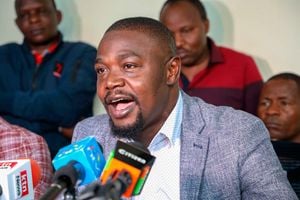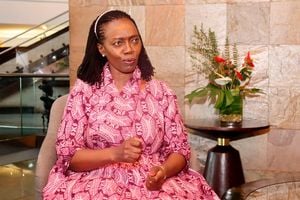How DP Kithure Kindiki's intervention averted planned doctors' strike

Deputy President Kithure Kindiki (centre) addressing the press after the signing of a deal between the government and doctors at his Karen residence on December 19, 2024.
The planned doctors’ strike that was to begin on Monday, December 23 will not proceed following a deal between the government and the medics to meet their long-standing demands.
The last-minute deal was brokered by Deputy President Kithure Kindiki after two meetings with the doctors, averting the impending strike and ensuring uninterrupted healthcare services for Kenyans.
Last Monday, during the governors' Summit, President William Ruto tasked DP Kindiki with resolving the looming doctors’ work boycott.
By Tuesday evening, Prof Kindiki had convened a two-hour consultative meeting in Karen with all health stakeholders, including ministry officials, technical advisers, and parastatal heads.
In the meeting, union representatives expressed their frustrations. They cited broken promises and a lack of trust in the system. They clarified that only direct payment into their accounts would prevent the strike.
As chair of the Intergovernmental Budget and Economic Council, Prof Kindiki engaged his team to devise a strategy that balanced legalities and practicality.
Funds transfer
After deliberation, the counties agreed to bypass their involvement in the funds transfer, resolving a dispute that in August crippled Kenya’s healthcare system in two months.
“Since this was just a one-time payment, with the remaining arrears scheduled for the next financial year, the governors consented to direct payments to the doctors,” disclosed an insider.
The strike was not about new grievances but long-standing issues over which the Kenya Medical Practitioners, Pharmacists, and Dentists Union (KMPDU) has expressed frustration.
They include the continued payment delays, which the Union claimed created a financial crisis for doctors and other healthcare staff.
By Wednesday, an agreement had been drafted between the Ministry of Health and the doctors, detailing the payment of arrears to doctors and interns. The agreement was approved and signed by all parties.
On Thursday morning, the Health ministry finalised the payment process, ensuring that funds were wired directly into the doctors’ accounts. The doctors had mentioned that they would only sign and call off the strike after seeing evidence that the monies had been wired to their accounts.
That evening, the union received proof of payment, leading to the signing of the agreement.
In addition to paying the arrears, Prof Kindiki assured the union that interns would be paid Sh206,000 as stipulated in their Collective Bargaining Agreement (CBA).
“While the funds were not initially included in the Finance Bill, the government has since found a way to honour this commitment. Interns will be paid Sh206,000 as outlined in the CBA,” DP Kindiki said.
KMPDU Secretary-General Dr Davji Atellah said the doctors' grievances are rooted in the persistent failure of county governments to honour their obligations to pay health workers on time.
The last strike was handled by the Ministry of Health and was referred to President William Ruto when the Kenya Medical Practitioners and Dentists Union and ministry officials disagreed.
The second strike notice, which was set to begin December 22, reiterated unresolved issues: the payment of interns’ salaries at Sh206,000 and the settlement of doctors’ basic arrears.
Although the National Treasury had released Sh1.7 billion to the Ministry of Health’s account in November, disputes over the County Additional Allocation of Revenue Bill in Parliament created a bottleneck.
“The Ministry of Health could not disburse the funds to counties as a conditional grant since the necessary framework had not been finalised. The ongoing contention between the National Assembly and the Senate required mediation,” said an insider.
“We had the money, Sh1.7 billion, set aside to pay the doctors, but if we had paid them directly, it would have been seen as undermining devolution. At the same time, we couldn’t send the funds to counties because the framework bill was incomplete,” he said.
KMPDU Deputy SG Dr Dennis Miskellah praised the collaborative approach and confirmed that all interns would receive their full salaries in December, with arrears accrued since August to be cleared in January.
“We appreciate that Prof Kindiki treated us with respect, recognising our professionalism. This was not about intimidation but finding a solution together,” said Dr Miskellah.
“Now that this has been resolved, our doctors can work with peace of mind.”
The dialogue also touched on the contentious use of the term "intern" for medical practitioners. While government representatives had previously suggested harmonising intern salaries across professions, union leaders maintained that medical interns, as fully qualified doctors under supervised practice, should retain their unique classification.
In the last strike the title ‘intern’ was a contentious one where the government argued that pay for interns should be harmonised across all professions and questioned why medical interns were paid more than their contemporaries.
Dr Atellah disagreed with the recommendation, insisting that the existing Medical Practitioners and Dentists Act already provides a clear definition of the term “intern”.
“CAP 253 of the Act of Parliament states that an intern is a doctor who has graduated, taken an oath, and is working under supervision. In our CBA, it is well defined in job group L. Changing the title does not change the work that they do at the hospitals,” he said.




